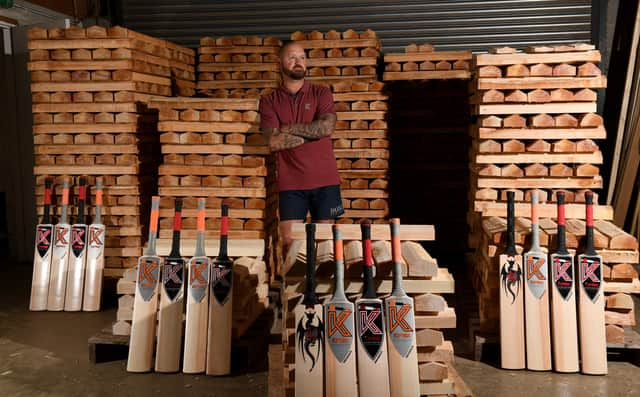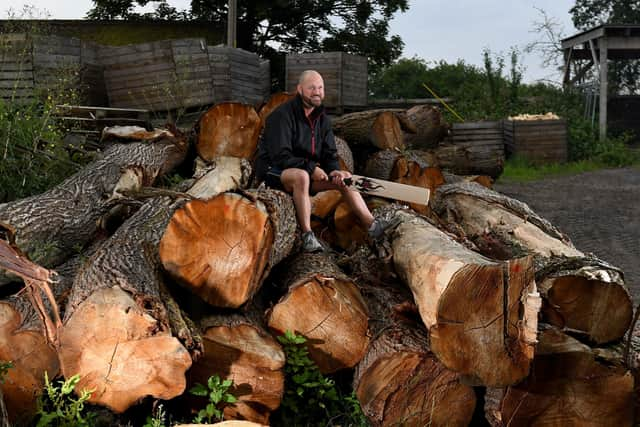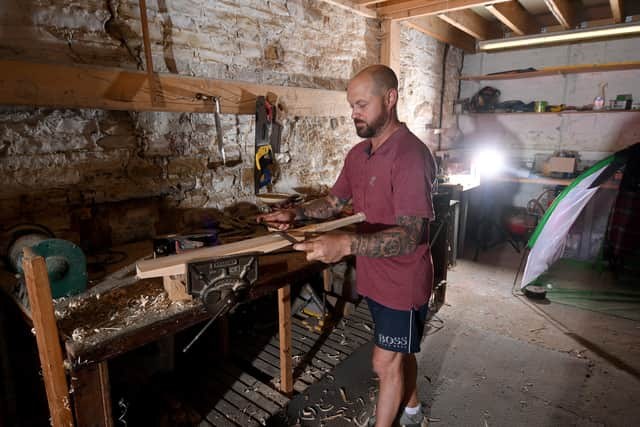Yorkshire firm still carves a living out of making cricket bats


Chris Kippax’s family business sees the game from copse to crease, nurturing and felling willow trees in local woodland and then hand-turning them into professional bats that command up to £500 each.
He sells 1,000 of them in a good year, but this year is anything but. Nearly 90 per cent of his sales have fallen away like leaves in autumn.
Advertisement
Hide AdAdvertisement
Hide Ad“March and April is Christmas for the cricket retailing business. But this year the market disappeared,” said Mr Kippax, whose late father, the former Yorkshire batsman Peter Kippax, founded the firm 44 years ago.


Like the willow trees it plants every year in Knaresborough and at Thorpe Underwood, north-west of York, the business is split down the middle. The manufacturing process, which accounts for around 60 per cent of revenue, has continued but the unsold end products are stacked like planks in his warehouse at Methley, between Leeds and Castleford.
“India is pretty much locked down as well, so we haven’t exported anything. The stocks are sitting here waiting to go but until they lift their restrictions and the economy starts to move again, they’re stuck here,” he said.
The late start to a truncated domestic season after lockdown stopped play had brought little relief, Mr Kippax added. Players had put off buying replacement bats until next year, preferring to have their old ones refurbished – a service Kippax Willow also provides.
Advertisement
Hide AdAdvertisement
Hide Ad“We’ll strip them and service them and put new labels on,” he said. “County players have three or four bats at any one time and they will number them and use them in rotation, Some players give their bats names.


“They grow acquainted to them and if they like them they will make them last as long as they can. But we’re hoping that they will at least come and buy new stock for 2021.”
Yorkshire is fertile territory for making bats from the ground up, with an abundance of wetland with clean running streams, in which willow trees grow best. After years of practice Mr Kippax can tell at a glance when each one is ready for felling.
“If you can touch your fingers when you hug the tree, then it’s big enough,” he said. “Then you look at the number of lengths you’re going to get out of it. We work on 30-inch lengths, so if you imagine the trunk as a tube of Rolos you can tell how many lengths you’re going to get.”
Advertisement
Hide AdAdvertisement
Hide AdHaving cut the trunk into sections, each one is then sliced like a pie into what are known in the trade as clefts – long wedges split along the grain, which form the blade of each bat.
Traditional manufacture like this is carried on at only a handful of sites around the country – the larger manufacturers preferring to buy their clefts from growers who plant and harvest them in vast numbers.
But it’s a model that has found favour with many players. The former England captain Graham Gooch voted Kippax Willow’s £380 Colossus bat, with its longer handle and shorter blade, his joint favourite.
Mr Kippax said the current climate did not mean the business could not continue “for the foreseeable future”.
Advertisement
Hide AdAdvertisement
Hide AdBut he added: “If it continues to impact into next year it gets more dicey. That’s true for everyone. We’re just praying that things get back to something like normal in 2021. In the meantime we’re working to the traditional British strategy of carrying on and keeping going.”
The making of willow cricket bats is considered an endangered craft. The Heritage Crafts Association, whose president is the Prince of Wales, lists it among the traditional English processes that are recognised neither as arts nor heritage and fall between the gaps of support and promotion organisations.
According to the Association, fewer than 20 people in the country now make their living from making bats – a craft which dates back to the 17th century.
Editor’s note: first and foremost - and rarely have I written down these words with more sincerity - I hope this finds you well.
Advertisement
Hide AdAdvertisement
Hide AdAlmost certainly you are here because you value the quality and the integrity of the journalism produced by The Yorkshire Post’s journalists - almost all of which live alongside you in Yorkshire, spending the wages they earn with Yorkshire businesses - who last year took this title to the industry watchdog’s Most Trusted Newspaper in Britain accolade.
And that is why I must make an urgent request of you: as advertising revenue declines, your support becomes evermore crucial to the maintenance of the journalistic standards expected of The Yorkshire Post. If you can, safely, please buy a paper or take up a subscription. We want to continue to make you proud of Yorkshire’s National Newspaper but we are going to need your help.
Postal subscription copies can be ordered by calling 0330 4030066 or by emailing [email protected]. Vouchers, to be exchanged at retail sales outlets - our newsagents need you, too - can be subscribed to by contacting subscriptions on 0330 1235950 or by visiting www.localsubsplus.co.uk where you should select The Yorkshire Post from the list of titles available.
If you want to help right now, download our tablet app from the App / Play Stores. Every contribution you make helps to provide this county with the best regional journalism in the country.
Sincerely. Thank you.
James Mitchinson, Editor
Comment Guidelines
National World encourages reader discussion on our stories. User feedback, insights and back-and-forth exchanges add a rich layer of context to reporting. Please review our Community Guidelines before commenting.